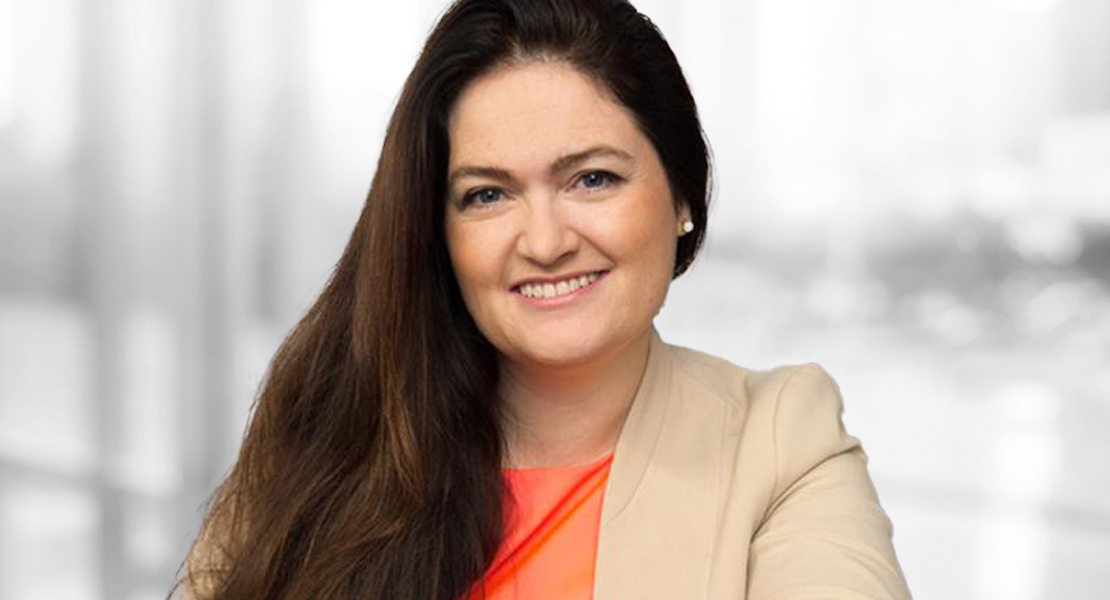Annette Siragusano heads Corporate Communications at comdirect bank AG and always keeps her eyes, ears, and heart attuned closely to the times. A digital mind, she loves not only accompanying transformation communicatively, but working with her team to give it shape, to tread new paths, to try out innovative forms of work, and to lead by good example. Her credo: “Only those who experience change themselves can accompany it successfully.” Vanessa Dahm and Ingrid Blessing met the vivacious #COM rebel at the Communications Congress 2019 in Berlin.
Detecon: Annette, comdirect is celebrating its twenty-fifth anniversary this year. As this is a bank without any physical branches, you have naturally been at the forefront of the online world right from the start. Did that automatically turn you into digital pioneers?
Annette Siragusano: We were founded twenty-five years ago as a telephone bank because there was no such thing as online at that time. The internet came two years later, and that was when we were able to begin operating as a digital bank. In a manner of speaking, our DNA was digital right from the start, which makes a lot of things easier even today. But we must continue our steady development just like anyone else. Changing customer demands, new competitors in the form of fintechs and GAFAs (Google, Apple, Facebook, Amazon) that are pushing hard onto our market, a low-interest environment with large banks that are undergoing transformation – the industry is in an extreme state of flux. We are very well positioned to deal with this, but of course nothing is automatic; we have to make things happen!
Both this year and last, comdirect was voted the best direct bank and now has been chosen as the best bank in Germany, it garnered a number of honors at the German Brand Awards, and it received the Digital Lab Award for exemplary innovation work from the business magazine Capital. What is the secret of your success?
Our customers can tell you best what we do right. (laughs) Many praise our good customer management, for example. You can reach us 24/7, which means you can call us even at three o’clock in the morning and talk to someone. That is simply the way things should be done in the world we live in today. On the other hand, we have an excellent user experience that is simple, smart, and fast. But let’s be honest: the challenge is that nobody really wants to talk about finances. The only thing that is worse is preparing your income tax return. So what can we do to demystify this topic? And how can we manage to make a topic like this fun, something people enjoy dealing with? I believe you have to think about things differently and mold them in such a way that they work without a second thought. This might mean, for example, that I dictate the information for my bank transfer form and no longer fill it out on the computer or on paper. This is a simple matter that takes no more than a few moments. The key issue is always one of adapting to people’s lives and finding a way to make their lives easier. That is what is so special about us.
To what extent do your customers have a say in the development of new topics?
We involve our customers very closely; for example, we have the comdirect insiders. This is a group of people who are happy to act as our test subjects when we want to try out something new. We frequently have a situation in which we launch the initial prototypes, learn from the feedback of our test groups, and build on this foundation for the next stage in the development of our product. The days when you started a project, created five hundred pages of description, finished a product after one year of development, and then discovered that none of your customers wanted to use it are past. We rely heavily on agile methods such as scrum or kanban in our work because we want to realize topics in short cycles and also be aware at every moment whether we are on the right track.
Speaking of innovation – what role does corporate communications play in all the changes you have prescribed for yourselves in the framework of digital change? You once said that you wanted to be a pioneer in this respect because only those who experience change themselves can accompany it communicatively.
And that’s the truth! Sometimes you wonder whether a direct bank really needs to change. But we have grown strongly in recent years. This leads to more and more processes of increasing complexity, and you have to ask yourself whether processes can be allowed to take command or whether you wouldn’t be better off retaining the original spirit, the startup mentality. We agreed then and we agree today: We must roll up our sleeves and get it done!
How can corporate communications support what is happening? I think we play a very relevant role here. It is not enough for everyone just to pull together and develop new leadership formats, for example. What you need here is a holistic concept. On the one hand, this means entering into a dialog with employees and discussing questions such as these: “What should our leadership be like?” “How do we want to work?” “What methods will support this?” And you have to show the outside world: “We are an innovative company, we are close to our customers.” Internal and external aspects must be consistent with one another because otherwise employees will not understand what is meant, either. Communications can do an excellent job of steering this process because it understands both sides well.
On the other hand, we ourselves must be prepared to change. A few years ago, for example, we completely restructured our approach, combining internal and external communications on one team. We set up a “T-shaped model”, broadened our skills set, and pulled many of our tasks into our purview. We don't currently work with any agency, we do everything ourselves – from film editing or podcasting to writing all our copy to social media. I always say we do it all, from wild to staid!
We can not only accompany this transformation communicatively, but experience it ourselves – with all its highs and lows. Unless you start with yourself, you cannot drive change.
Agile methods, new ways of working, media, and channels – you don't miss out on any innovations and are always open to new trends. How much Annette Siragusano is in all this willingness to change? What drives you?
I like doing something new. I enjoy striking out on new paths and am always ready to try something out on a blank page. That certainly has something to do with it. But we are also a highly diversified team whose members can contribute a wide range of perspectives and know-how. Great things are the result. I am driven to empower people, to create space for their skills and interests, and to have confidence in what they do. Because then they flourish, tackle their topics with enthusiasm, and assume responsibility. Overall, you can accomplish a lot more as a member of a team than any individual can achieve on his or her own. And we’re a great team that’s really keen.
What kind of people are on your team? Are you all classic communicators?
We are extremely diversified and have wide-ranging interests. Although we do so much media, i.e., film editing, podcasting, etc., we didn't buy the expensive services of media experts, but taught ourselves everything. When you have people in your team who want to continue their personal development and try things out, you can have a lot of fun. We share new knowledge within the team. And that is a completely different kind of commitment than when only one member of the team is the “pro.”
You have the reputation of being a true digital mind. What current digital achievements fascinate you the most?
Oh, there are so many exciting topics! I am delving deeply into the topic of artificial intelligence. And there has long been a focus on the aspects of processes and customer journey, i.e., in the sense of data mining. Here at the congress, I am learning about completely new aspects such as the coupling of the terms artificial intelligence and sustainability in conjunction with the question, “Can AI improve the world?” An extremely interesting aspect!
Voice, of course, continues to be a metatrend. We have been working very hard in this area for several years. We were the first with Alexa and Google Scale, we have voice banking – this is a priority topic – and we still haven’t come to the end of the road. Of course, mobile remains a metatrend as we can see in the communications behavior of our customers and even more in that of our children and naturally all the generations coming after us. The topic “handling of data” is becoming more and more important.
To put it succinctly, the great topic of our time is the interaction between man and machine.
Your CEO is active on Twitter, Instagram, and LinkedIn, your C-level officers write their own posts. But not everyone is a born storyteller, and not everyone has mastered the art of hashtags and retweets. How do you empower your colleagues so that they distribute the “right” messages correctly?
I believe that a digital company also needs a digital face. And it has to present this face on social media as well. This face is more than just the corporate channels; management is one of its features, too. I don’t think – and this is my personal opinion – that you can get things to work by forcing people to do things or by backing them up with an agency that contributes a lot of reach. I’m a fan of encouraging people and showing them what impact they can have with honest communication. Social communication is not the substitute for a press release; it is about expressing a genuine opinion. That’s why I think it’s good for the C-level officers and management colleagues to do it themselves with our support. And I think they’re doing a really fine job. So what if an “Eintracht Frankfurt tweet” suddenly pops up? The boundaries between channels are becoming more and more blurred. The distinction between internal and external is becoming fuzzy, and it is important to take a credible stand on topics. Communication becomes more and more authentic as a result. I appreciate that.
Are other comdirect employees active in social media?
Of course, those of us on the UK team or the finanz-heldinnen are very active, but other areas are equally so. We do not have a strategic corporate influencer program, however; we emphasize enabling. Our colleagues are happy to stop by and to let us help them. We believe that a company is the sum of the diversity of the people who work there.
If everyone can and should communicate with everyone else, what role will the central corporate communications department have to play in the future?
One of trust. I don't think you can forbid anything in this day and age, it’s going to happen, anyway. Either you get it or you don’t. We communicators must learn to give people space to try something out. Then people deal with one another in a spirit of trust.
How do you personally manage to stay up to speed with what is going on despite the scorching pace at which everything everywhere is changing?
I think I succeed at that because I am lucky enough to work on an incredibly cool team. Somebody has always just seen something new and comes up with stimulating ideas. Moreover, I find it exciting to get out and go to events like this one, for example. And I put my faith in the power of networks. For example, Global Digital Women (GDW) is a very powerful women’s network you can use for the open exchange of ideas and where you can find inspiration.
Our obligatory final question: What two apps are indispensable for you as a communicator in your everyday life?
Two are not enough for me, almost everything I do is “mobile.” Of course, all the social channels (Insta, Twitter, LinkedIn) – they count as one. Then our email client, the comdirect app, and our finanz-heldinnen app. But there are so many others. And perhaps the most important app is Screen Time on the iPhone. Not only to check and as necessary correct your own behavior, but that of your children as well. (laughs)
As if we didn’t already know, here is the final proof: this is a genuine digital mind. Annette, thank you so much for this interview.
#COMRebels
In the age of digital change, corporate communication is no longer what it used to be, either: familiar ways of disseminating information are becoming less important, smooth corporate news can no longer get through, and the 'everyone with everyone dialogue via social media and communities is causing traditional communication teams to lose control over the dissemination of the message. On the other hand, chatbots and artificial intelligence provide completely new access to the needs of customers, employees and applicants, but they also bring about fundamental technical and cultural changes. Long live #FutureCOM.
Beautiful new world of unlimited possibilities?
What does it look like now, the (digitized) corporate communication of the future? How, where and by whom will the exchange of information take place? And how do we shape the interaction between man and machine?
We are looking for answers...
... and talk to the #COMRebels, the courageous, young, wild, digital and experimental representatives of a species whose work plays a key role in transforming your business into a successful player in the digital age
Are you looking for help with your corporate and change communications?
Here you will find our Future Communications consulting portfolio.
Many thanks to Ingrid Blessing for her contribution to this article.






